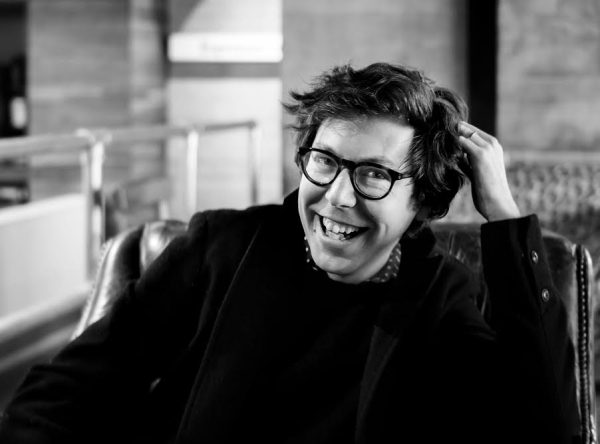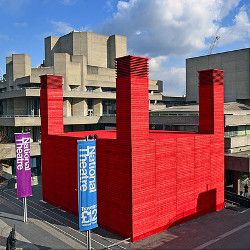Ben Power talks dramaturgy, rebranding The Shed and rethinking Medea

© Bill Knight
Interviews with Ben Power all start in the same way. The influential but elusive National Theatre associate director is now used to journalists questioning him on the exact nature of his role under artistic director Nick Hytner. Despite his official title, he rarely directs as such, instead taking a lead on programming and developing new work. He describes himself as a writer and dramaturg, but he understands that this label has its difficulties.
"People don't really know what I mean by dramaturg," he says, "it's very hard in this culture." Whereas in continental Europe and even the USA, dramaturg has a clearly defined meaning within the creative process, in Britain it's a disputed and often misunderstood term. While the role varies from project to project, Power suggests that it is "about trying to understand what the authorial intention is, and to really investigate that and make that as clear as possible for an audience".
Power fell into this role as a result of his work with director Rupert Goold early in his career, first at Northampton's Royal and Derngate Theatre and later with touring company Headlong. During this time, the pair collaborated closely on a series of radical reworkings of classics, including a Dr Faustus refracted through the lens of artist provocateurs Jake and Dinos Chapman and a bold reimagining of Luigi Pirandello's Six Characters in Search of an Author.
This latter production offers the perfect example of Power and Goold's approach. "When the play was written, it was a huge scandal," says Power. "People were rioting – it was really incredibly provocative and incredibly upsetting. And it had over 80 years turned into an incredibly accessible piece of boulevard comedy. What we perceived to be Pirandello's intention to create something provocative and shocking and a bit dangerous had been lost to a certain extent."
Headlong's production sought to reactivate the play's radical potential by updating it to the 21st century and placing it within the frame of modern documentary filmmaking. "To try and find the elements of the original play which felt like they might really deliver that to an audience and put them in a context in which that was very clear was the intention," Power explains, suggesting that the piece became less about the narrative and more about "these philosophical things about reality and identity".
Six Characters in Search of an Author, which was co-adapted by Power and Goold in a remarkably equal partnership, also demonstrates Power's appetite for collaboration. "Something has emerged about not just subject matter or even form for Headlong, but process as well," Power argues. "That kind of collaboration, working across and outside of conventional sorts of roles and job titles, feels to me to be really important."
'Catalyst for ideas'
Power has carried this way of working over to the National Theatre, where he has been an associate since 2010. For him, collaboration simply makes sense. "It sounds kind of trite to say, but I just think if we wanted to work on our own, we would be novelists or painters. The theatre insists upon collaboration." Animatedly discussing the input of various designers and performers, he adds that "every different element, every component of the event should be contributing towards the same meaning".

As well as working closely with Hytner and his fellow associates to develop new work and introduce new artists to the organisation, in the last 12 months Power has taken on responsibility for programming the National Theatre's newest space. The Shed, the bright red temporary structure that has taken up residence on the side of the river, has become a vibrant extension of the National's core work, inviting in exciting visiting artists and nurturing new in-house projects.
"To have the opportunity of this dedicated space to really push an agenda of progressive, challenging, diverse work has been really great for me," says Power. At first, his approach was simply to programme work that excited him, such as Rob Drummond's one-man show Bullet Catch and the TEAM's American epic Mission Drift. A year on, however, Power insists that space has become a "catalyst for ideas", inspiring growing numbers of artists to approach him with suggestions for new work.
When we meet at the National Theatre, one side of the vast concrete complex is shrouded in a mesh of scaffolding, an outwardly visible sign of the ongoing transformation within. Power, a new father, jokes that he went away for a fortnight's paternity leave and came back to find a completely different building. And while the theatre's public spaces undergo a major revamp, there is also change on the horizon for The Shed.
The space, which was initially envisioned as a year-long replacement for the Cottesloe (currently being remodelled as the Dorfman), will now remain open until 2017. Power tells me that the venue will go dark during the opening of the Dorfman at the end of this year, before resuming activity under new artistic director Rufus Norris with a "slightly reorientated" focus. For a start, it will need a new name, as the National's rights to "The Shed" have run out.
Although plans are currently very fluid, Power hopes to be able to programme more political shows in the "temporary space" next year, as well as extending its work for younger audiences. "If anything, it will become more like itself," he says. "The things which have felt most distinct about this year, it will do them more so. More emerging artists, more young companies, more formally experimental work."
'The ultimate divorce play'
Alongside looking after The Shed, the project that is currently dominating Power's workload is his new version of Medea, directed by Carrie Cracknell in the Olivier. He explains that he and Cracknell had felt "unsatisfied" by many of the productions of Greek plays that they had seen over the years, producing a desire in both of them to make this drama work for modern audiences.
In his version of Euripides' tragedy, which he describes as "the ultimate divorce play", Power hopes to explore "how this story – which can be a story of golden fleeces and dragons and chariots and a woman who says she's a witch – can actually be a story about families and marriages". Blending the classic and the contemporary, he is also interested in how the play can "explode out of something quite located and recognisable into something timeless and epic". It is, he admits, a formidable challenge.
Power's own restless movement, between large-scale classics, experimental new plays and fledgling artists, reflects a flow that he also sees in audiences. "I think our audiences, and audiences in theatre generally, are getting far more adept at moving between a classic revival of a play and a new play and something with no text and something where a guy only speaks on tape recorders all night," he says, pointing to the popularity of comedian and theatre-maker Daniel Kitson as a prime example.
"Things are much more fluid now than maybe they were ten years ago," Power claims, putting much of this down to Hytner's canny programming. "There has been a real broadening," he continues, "and The Shed is only the last bit of that".
What The Shed has helped the National Theatre to think about in the months preceding its change of artistic leadership is "how one might take some of that energy of diversity and different forms and different processes and write that large over the entire organisation". Power hopes that the kind of work being seen in The Shed can eventually move into the Lyttelton and the Olivier and "be as challenging and provocative and progressive in those spaces as we have tried to be in The Shed, but in a way which feels supported".
But surely there's a limit to how much experimentation the structures of a huge institution like the National Theatre will allow? Power thinks not. "I think maybe we tell ourselves – sometimes I tell myself – that there is, and actually the best work proves that there isn't," he says, naming the "total paradigm shift" of verbatim musical London Road as an example. He does concede, however, that "what's hard is building a model that allows you to fail, that gives you the right to fail within an organisation as big as this".
It is this model that Power is now looking towards, focusing his attention on creating "a really robust but really free set of development processes" for artists working with the theatre, and on communicating the National's work to audiences in ever more creative ways. He firmly believes that a shift is underway, both in the attitudes of audiences and in the increasingly collaborative structures of British theate-making.
"I think increasingly we'll see the role of dramaturg emerge in this culture," Power suggests. He pauses for a moment, before adding with a laugh, "I hope so, because it's lonely if it's just me."
The Shed, or 'Temporary theatre', is currently home to David Henry Hwang's Yellow Face. Polly Stenham's new play Hotel premieres next month.










